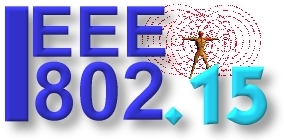
IEEE 802.15 WSN
Task Group 16t
Licensed Narrowband
(Updated: Wednesday, 20 July 2022)
|
|
| IEEE Wireless Zone |
| IEEE 802.18 RR TAG |
| IEEE 802.19 Coex TAG |
| IEEE 802.20 MBWA |
| IEEE 802.21 MIHS |
| IEEE 802.22 WRAN |
| IEEE 802.23 ES |
Introduction and Need:
Mission
critical entities have a strong preference for private, licensed
networks for their data communications needs. Licensed channels from 5
kHz to 1 MHz may be available from the FCC and other regulators or may
be purchased in secondary markets at a lower cost than commercial
channels. Examples of operating frequencies include 160 MHz, 450 MHz,
700 MHz, and 900 MHz. Furthermore, VHF/UHF channels have superior
propagation characteristics requiring less infrastructure and are
capable of meeting capacity needs of private networks. The amendment
facilitates the development of innovative, cost-effective, and
interoperable multivendor products for private licensed wireless access
systems for mission critical networks. Applications include smart grids
supporting generation, transmission, and distribution; field area
networks; smart fields and smart pipes for oil and gas; intelligent
transportation for rail systems; and federal, state and local uses for
homeland security, environmental and seismic monitoring and military
communications.
Scope:
This project specifies operation in licensed spectrum with channel bandwidths greater than or equal to 5 kHz and less than 100 kHz. The project will specify a new PHY, and changes to the MAC as necessary to support the PHY. The amendment is frequency independent but focuses on spectrum less than 2 GHz. The range and data rate supported by the narrower channels are commensurate with those of the base standard, as scaled by the reduced channel bandwidth. The project also amends IEEE Std 802.16 as required to support aggregated operation in adjacent and non-adjacent channels.
Call for Contributions (February 2020)
The IEEE 802.15.16t Task Group is developing an amendment to 802.16-2017. Project 802.16t “Amendment - Fixed and Mobile Wireless Access in Narrowband Channels”
This project specifies operation in licensed spectrum with channel bandwidths greater than or equal to 5 kHz and less than 100 kHz. A new PHY will be specified, with changes to the MAC as necessary. The amendment is frequency independent but focuses on spectrum less than 2 GHz. Aggregated operation in adjacent and non-adjacent channels will be supported.
This Call for Contributions solicits input documentation toward the development the amendment.
Contributions are sought on the following topics;
- Presentations on use cases, scenarios, and applications
- Contributions toward the System Requirements Document
Please use document IEEE 802.15-20-0070r0 as a template to describe your use cases.
Call for Contributions (February 2022)
This project specifies operation in licensed spectrum with channel bandwidths greater than or equal to 5 kHz and less than 100 kHz. A new PHY will be specified, with changes to the MAC as necessary. The amendment is frequency independent but focuses on spectrum less than 1 GHz. Aggregated operation in adjacent and non-adjacent channels will be supported.
This Call for Contributions solicits contributions toward the development the amendment draft. The approved PAR is available at this link.
Contributions are sought supporting the development of the Project 802.16t Draft.
- Specific text proposals based on the outline in IEEE 802.15-22-81r1 (or subsequent) as a guideline.
- “Free form” contributions, which include proposals and analysis.
Please use Visio for drawings and follow table structures for any table additions.
Meetings and teleconferences are announced on the TG16t reflector and the 802.15 calendar.
Documents should be uploaded to Mentor, to the TG16t task group.
For more information contact the TG16t chair Tim Godfrey tim.godfrey@ieee.org
Key Documents
Use Case Spreadsheet 802.15-20-213r13Approved System Requirements Document 802.15-22-0033r3
Approved System Description Document 802.15-22-0084r2
Information
Who to contact with questions
- Chairman: Tim Godfrey
- Vice Chairman: <open>
- Technical Editor: Harry Bims
The Institute of Electrical and Electronics Engineers, Inc.